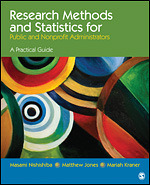Research Methods and Statistics for Public and Nonprofit Administrators
A Practical Guide
- Masami Nishishiba - Portland State University, USA
- Matthew Jones - Portland State University, USA
- Mariah Kraner - Portland State University, USA
"The approach is well executed. The problems encountered by [the characters] represent real-life issues than administrators are faced with and the applications needed to address them."
—Lee W. Payne, Stephen F. Austin State University
Research Methods and Statistics for Public and Nonprofit Administrators: A Practical Guide is a comprehensive, easy-to-read, core text that thoroughly prepares readers to apply research methods and data analysis to the professional environments of public and non-profit administration. The authors expertly incorporate original case examples to demonstrate concepts using “real actors,” facing specific scenarios, in which research methods must be applied. This unique approach—presented in language accessible to both students new to research as well as current practitioners—guides the reader in fully understanding the research options detailed throughout the text.
"The case approach used in the text presents a very exciting way for students to apply research methods/statistics to cases, rather than applying it to short problems at the end of most textbooks."
An excellent combination of real life issues to conceptualise the theoretical perspectives of research in the not for profit sector.
Thank you
This book has very clear examples about correctly using some of the most common statistical tools. It is an interesting manual that will be very useful for a large range of graduation and post-graduation courses, in the field of Social Sciences.
The applied context of the book makes it an interesting support for students who are undertaking research methods in programs which are practice-oriented. I particularly the case made for research skills as leadership skills, in the first chapter.

